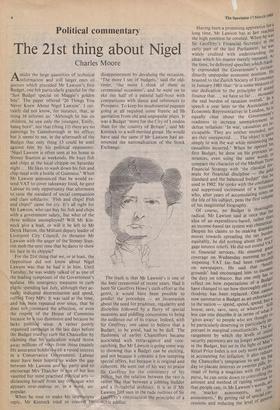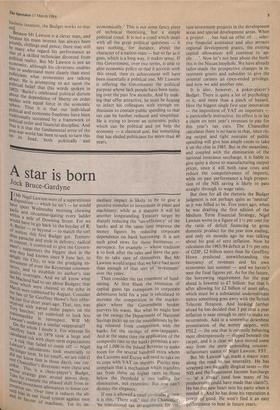Political commentary
The 21st thing about Nigel
Charles Moore
A midst the large quantities of technical ra.information and still larger ones of
guesses which preceded Mr Lawson's first
Budget, one felt particularly grateful for the 'Sun Budget special on Maggie's golden
boy'. The paper offered '20 Things You Never Knew About Nigel Lawson'. I cer- tainly did not know, for instance, that, as thing 16 informs us: 'Although_ he has six children, he saw only the youngest, Emily, being born', nor that (thing 11) there are no paintings by Gainsborough in his office; but it seems to me, in the aftermath of the Budget that only thing 13 could be used against him by his political opponents: 'Nigel Lawson is often seen at his home in Stoney Stanton at weekends. He buys fish and chips at the local chippie on Saturday night , .. He likes to wash down his fish and chip meal with a bottle of Guinness.' When Mr Lawson announced that he would ex- tend VAT to cover takeaway food, he gave Labour its only opportunity that afternoon to raise the standard of social compassion and class solidarity. 'Fish and chips! Fish and chips!' came the cry. It's all right for Mr Lawson, who can buy his fish and chips with a government salary, but what of the three million unemployed? Will Mr Kin- nock give a lead, or will it be left to Mr Derek Hatton, the Militant deputy leader of Liverpool City Council, to threaten Mr Lawson with the anger of the Stoney Stan- ton mob the next time that he dares to show his face in its chippie?
For the 21st thing that we, or at least, the Opposition did not know about Nigel Lawson was that he had it in him. Until Tuesday, he was widely talked of as one of the leading symptoms of the Government's malaise. His emergency measures to curb public spending last July, although they ac- tually indicated determination and speed, ruffled Tory MPs. It was said at the time, and has been repeated ever since, that he does not command the affection, or even the respect of the House of Commons because he is too dismissive and because he lacks political sense. A rather poorly organised campaign in the last days before the Budget tried to curb the Chancellor by claiming that his radicalism would throw away millions of votes from those (mainly life assurance holders) with a vested interest in a Conservative Government. Labour must have been hoping to widen the gap between Mr Lawson and his party and to encourage Mrs Thatcher in one of her less vaunted but most practised political arts distancing herself from any colleague who appears over-zealous or, in a word, un- popular.
When he rose to make his impromptu reply, Mr Kinnock tried to conceal his disappointment by devaluing the occasion. 'The more I see of budgets,' said the old- timer, 'the more I think of them as ceremonial occasions', and he went on to eke out half of a painful half-hour with comparisons with dance and references to Prospero. To keep his insubstantial pageant going at all required some frantic ad lib quotation from old and unpopular plays. It was a Budget 'more for the City of London than for the country of Britain', said Mr Kinnock to a well-merited groan. He would have said the same if Mr Lawson had an- nounced the nationalisation of the Stock Exchange.
The truth is that Mr Lawson's is one of the least ceremonial of recent years. Had it been Sir Geoffrey Howe's sixth effort at the genre, it would have been possible to predict the procedure — an incantation about the need for prudence, regularity and discipline followed by a flurry of special measures and piddling concessions to bring the audience out of its trance. Indeed, with Sir Geoffrey, one came to believe that a Budget, to be good, had to be dull. The flashiness of earlier Chancellors became associated with extravagance and vote- catching. But Mr Lawson is going some way to showing that a Budget can be exciting, and not because it contains a few tempting special offers, but because it is original and coherent. He went out of his way to praise Sir Geoffrey for the consistency of his policy, but the relation between the two is rather like that between a jobbing builder and a thoughtful architect. It is as if Mr Lawson _bad seen in the rude outlines of Sir Geofffey's construction the principles of a noble edifice. The Spectator 17 March 1984 Having been a promising apprentice for a long time, Mr Lawson has at last reached the high position he coveted. When he was Sir Geoffrey's Financial Secretary in the early part of the last Parliament, he was widely credited with understanding the ideas which his master merely repeated. At the time, he delivered speeches which frank" ly expounded the Government's extraor- dinarily unpopular economic position. Ile boasted to the Zurich Society of Economics in January 1981 that: 'It is some measure of our dedication to the principles of sound finance that... we have so far... increased the real burden of taxation overall.' In t!. speech a year later to the Association of Economic Representatives in London, he is equally clear about the Governments readiness to increase unemployment to defeat inflation: 'In war, casualties are in" escapable. They are neither intended, Of are they unexpected .... The object is Quite simply to win the war while minimising the casualites incurred.' When he opened hu first Budget, he drew on his previous tit" terances, even using the same words c) compare the character of the Medium Term Financial Strategy with 'the classical for mula for financial discipline — the gold he standard and the balanced budget' that '– used in 1982. He spoke with the confides and suppressed excitement of a historian who, after years of accumulating notes the life of his subject, pens the first volume of his magisterial biography. Of course, no Budget is thoroughly radical. Mr Lawson said at once that than
idea of an expenditure-based, rather , an income-based tax system was chimer'calc' Despite his claims to be making drarnati"en moves towards spreading the tax
equitably, he did nothing about the T hr rt o gage interest reliefs. He did not extend VAit to financial services. He ensured Pot coverage on Wednesday morning hY !Ivo imposing VAT (as had been rill/total on newspapers. He said that iheaw grounds' had encouraged him to iner'to the duty on tobacco. But one onlYilti:Iget reflect on how expectations of a Du4r. have changed to see how thoroughly 01d not thodoxy has been replaced. One eartri.on tnoowthesun matmioanrise aspBenuddgespt eansdanspexenhdortbausnytilla house; save, save, save; or whatever. t it less can one describe it in terms of wh: to 'gives away' to people who are tholig"t.or be particularly deserving or particularly tar. portant in marginal constituencies. Thectat rangement by which the levels of sc)caci security payments are no longer anno_un in the Budget, but set in the light of Ma)ate Retail Price Index is not only more aec,urces in accounting for inflation: it also reatita the Chancellor's temptation to use his day to placate interests or sweeten Pills'oinc stead of being a magician with the Pe the purse, he can settle down to controllinge so amount and method of raising revel° act that people can, in Mr Lawson's words' tax on 'market assessments, 11°tcn' assessments.' By getting rid of special erai cessions and reducing the level of gee
business taxation, the Budget works to that end.
Because Mr Lawson is a clever man, and because his main interest has always been Pounds, shillings and pence, there may still be many who regard his performance as that of a skilled technician divorced from Political reality. But Mr Lawson is not an economist, although his cleverness enables him to understand more clearly than most Politicians what economists are talking about. He is attempting to act upon the Political belief that (his words spoken in 1982): 'Burke's celebrated political dictum about the dependence of liberty on order applies with equal force in the economic sPhere. Thus it is that our individual Political and economic freedoms have been traditionally sustained by a framework of Political order and financial discipline. And thus it is that the fundamental error of the Post-war world has been to seek to turn this On its head, both politically and
economically.' This is not some fancy piece of technical theorising, but a simple political creed. It is not a creed which deals with all the great political questions — it says nothing, for instance, about the character of a nation-state but so far as it goes, which is a long way, it makes sense. If this Government, over two terms, is able to alter economic policy so that it accords with this creed, then its achievement will have been essentially a political one. Mr Lawson is offering the Government the political purpose whose lack people have been notic- ing over the past few months. And by mak- ing that offer attractive, he must be hoping to infect his colleagues with enough en- thusiasm to contain public spending so that tax can be further reduced and simplified. He is trying to invent an economic policy which can be political and yet help the economy — a classical aim, but something that has eluded politicians for more than 40 years.















































 Previous page
Previous page